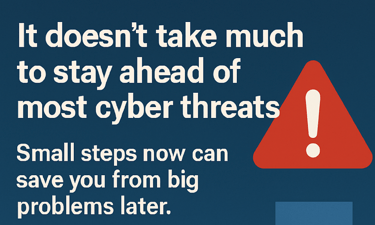
Your Digital Life Is Under Attack: What Happened in June and July 2025 and What You Need to Know
6/30/20252 min read
Why should I care about password leaks
In June, hackers released 16 billion stolen passwords from services like Google, Facebook, Apple, and Telegram. It’s one of the largest leaks ever.
What it means for you: If you reuse passwords, criminals can log into your accounts like email, banking, or social media without needing to hack you directly.
Your move: Stop reusing passwords. Use a password manager. Always turn on multi-factor authentication (MFA).
What happened with the SharePoint hack?
A serious "zero-day" vulnerability in Microsoft SharePoint was discovered and is being actively used by hackers. It affects organizations using their own on-premise SharePoint servers.
What it means for you: Hackers used this flaw to steal sensitive data, including private encryption keys from government offices, businesses, and other large groups. Even if systems are patched now, the stolen keys may still be in the wrong hands.
Who was hit: Over 75 systems were known to be compromised, including federal agencies and private companies.
Your move: If you run a business or organization, make sure your IT team checks for this threat. If you're using cloud services, you're safer but stay alert for updates and official warnings.
What kind of personal data was stolen?
Hackers targeted names, emails, phone numbers, car info, health records, and even Social Security numbers.
Zoomcar: 8.4 million users had their contact and vehicle info stolen.
U.S. Healthcare: 7.6 million patient records were exposed. Major breaches hit Episource and McLaren Health Care.
AT&T: 44 million Social Security numbers were confirmed stolen, which is a big risk for identity theft.
UBS: 130,000 employee names and contacts leaked after a partner firm was hacked.
What is ransomware and who was hit?
Ransomware locks up a company’s data. Hackers demand money to unlock it. This summer, these attacks exploded.
Hit targets: Hospitals, media groups like Lee Enterprises, tax services like Optima Tax Relief, and even political parties in Australia were hit.
Why it matters: Services we rely on every day like healthcare, news, or utilities can stop working.
Can I be hacked through a company I trust?
Yes. Many attacks now start by breaching a company’s smaller partners.
Qantas: The airline lost up to 6 million customer records after its contact center provider was hacked.
Dell: Hackers broke into a demo system at its Customer Solution Center.
UBS: A supplier breach exposed internal employee details.
The lesson: You might trust the brand, but your data depends on every link in their supply chain.
Are there dangers hidden in my phone?
Yes. Some of the most popular apps ask for way more access than they need.
What the study found: Apps like Facebook, WhatsApp, TikTok, and Amazon ask for access to your mic, photos, files, and location even if they don’t need them for their core function.
Your move: Open your phone settings and check app permissions. Turn off anything unnecessary.
What else happened that should worry me?
Crypto theft: India’s CoinDCX exchange lost $44 million in a breach.
Political attacks: Australian political groups connected to Clive Palmer were targeted with ransomware and data leaks.
Your 3-Step Action Plan to Stay Safer Online
Use strong, unique passwords for every account. Don’t reuse the same password.
Turn on MFA wherever it’s offered. It stops most account takeovers.
Think before you click. Don’t trust unexpected links in emails or apps that ask for extra access.
It doesn’t take much to stay ahead of most cyber threats. Small steps now can save you from big problems later.


This summer, cyberattacks exposed hundreds of millions of records, including personal data.
Here’s a clear, simple guide to what happened and how to stay safe.
!

